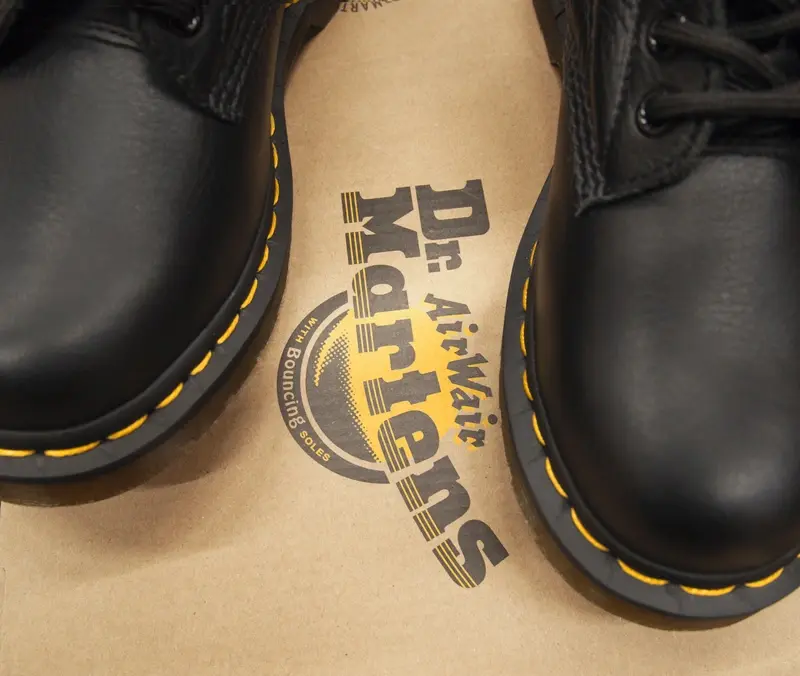
- Pre-tax profits drop 26% in difficult year
- Ongoing investment to hold back margins
- But issues in America are being fixed
Dr. Martens (DOCS) received another kicking from investors today, the shares booted 10% lower to 141p despite the iconic footwear brand reporting a 10% rise in sales to reach the £1 billion milestone for the first time in the year to March 2023.
Unfortunately, pre-tax profits tumbled 26% to £159.4 million in a tough year.
And while Dr. Martens maintained its current-year revenue guidance of mid-to-high single-digit growth, it warned earnings before interest, tax, depreciation and amortisation (EBITDA) margins are expected to be 1% to 2% lower year-on-year due to ongoing investment in infrastructure to support the long-term growth of the brand.
Dr. Martens also expects this year’s sales and profit to be more weighted towards the second half than normal, suggesting a lot has to go right for the retailer to meet the market’s downgraded forecasts.
WHY DID EARNINGS STUMBLE?
Dr. Martens’ disappointing earnings decline reflected slower revenue growth last year combined with continued investment in new stores, marketing and people and £15 million of costs associated with its Los Angeles distribution centre issues.
Changing its distribution and ecommerce systems across the Atlantic went wrong and the company stepped away from its core product of boots, switching its focus to shoes and sandals when the weather meant they weren’t wanted.
And with US shoppers being kicked by cost-of-living pressures, Dr. Martens over-ordered, which meant it had stock piling up in an already clogged distribution network.
KENNY’S MEA CULPA
As chief executive Kenny Wilson explained: ‘In America, against the backdrop of a challenging consumer environment, we made operational mistakes, such as the move to our LA Distribution Centre, and how we executed our marketing campaigns and ecommerce trading.’
Wilson insisted: ‘We have undertaken detailed reviews to understand why these issues occurred and have begun to embed the lessons learned into the business. We are fixing the issues in America, including a significant strengthening of the team there, and returning America to good growth is our number one operational priority.’
HOW IS CURRENT TRADING?
Camden Town-based Dr. Martens said trading since the start of the new financial year has been in line with management’s expectations with ‘very good’ direct-to-consumer (DTC) growth, although wholesale revenue was lower than last year as expected.
Supply chain costs are rising, but the company says it will be able to cover these with price increases.
The board also demonstrated confidence in the long-term growth and cash generation of the business by maintaining the final dividend at 4.28p per share and announcing a £50 million share buyback.
JUST WHAT THE DOCTOR ORDERED
Begbies Traynor’s (BEG:AIM) Julie Palmer believes that at a time when consumer finances are stretched, Dr. Martens is well placed. ‘Its big-selling, big-soled boots and shoes may be expensive, but are built to last and what shoppers increasingly wanting durability as well as fashion are seeking out.
‘So the famed British business’s global sales hitting £1 billion for the first time was just what the doctor ordered for this much-loved brand after huge mis-steps in the US.’
Palmer added: ‘Despite problems, the company has a bounce in its step with the boot bosses confident enough to launch a share buyback and continue the dividend, though investors who bought in when Dr Martens floated in early 2021 have taken a hit, with the shares having halved since then.’
AJ Bell investment director Russ Mould said the company’s footwear may be iconic but its time on the stock market has seen ‘little to celebrate for Dr. Martens, which tripped up yet again with its latest update and is now at less than 40% of its value when listing in 2021.
‘Dr. Martens has struggled operationally but also hasn’t done a good job of managing expectations. This is a key part of being a public company, where the aim should always be to under-promise and over-deliver.’
Mould continued: ‘It feels like the brand is strong enough for Dr Martens to stand tall on the stock market and the current management team may come under increasing pressure if they don’t deliver soon.’
Disclaimer: Financial services company AJ Bell referenced in the article owns Shares magazine. The author of the article (James Crux) and the editor of the article (Ian Conway) own shares in AJ Bell.
LEARN ABOUT DR. MARTENS





